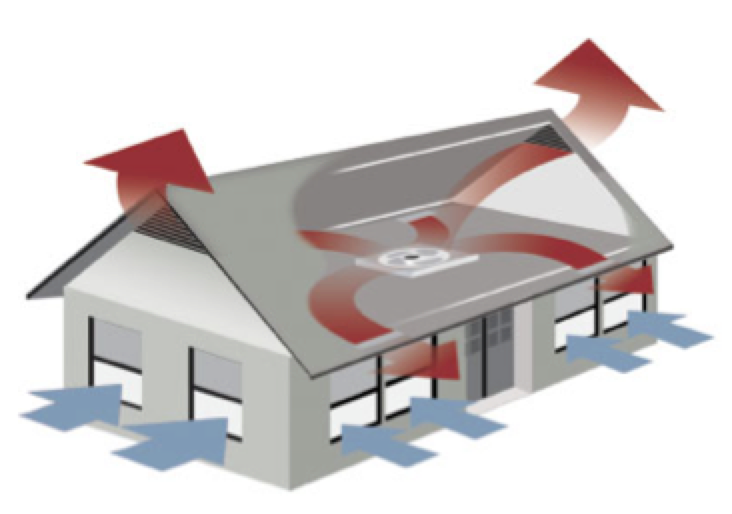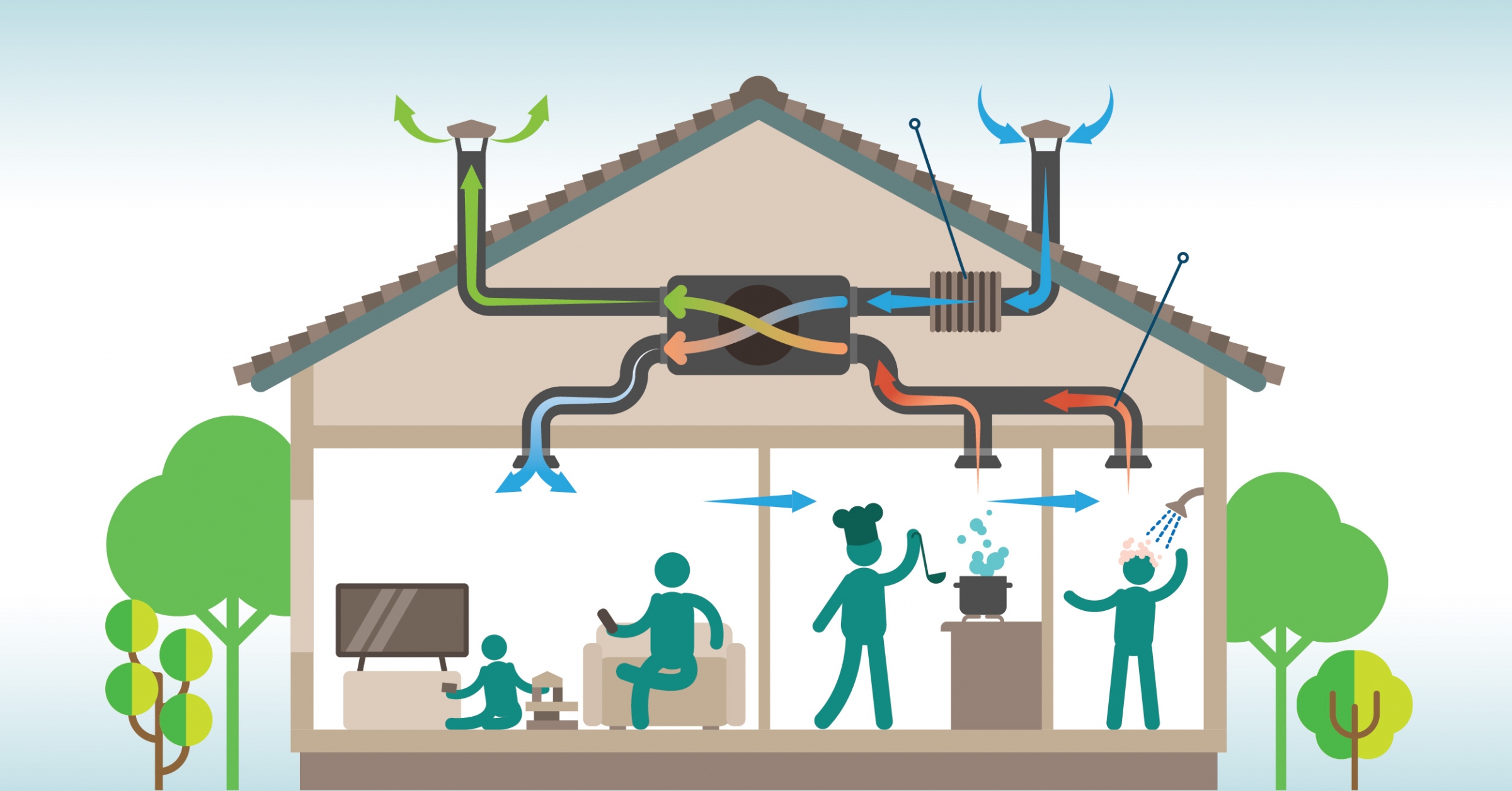Top 7 Benefits of Choosing Home Ventilation Melbourne Solutions
The Role of Home Air Flow in Avoiding Mold And Mildew and Indoor Allergens
Home ventilation is a critical component in preserving a healthy and balanced interior setting. It controls moisture levels, which can protect against the growth of mold and mildew and the buildup of allergens. Lots of property owners forget the significance of appropriate air flow, commonly leading to hidden concerns. Understanding just how air flow systems function and their impact on air top quality could be the secret to a much healthier living space. What steps can be taken to boost these systems efficiently?
Comprehending Home Air Flow Equipments
While many property owners might forget the relevance of ventilation, understanding home ventilation systems is essential for keeping interior air quality and preventing mold development - Home Ventilation Melbourne. These systems facilitate the exchange of stale indoor air with fresh outdoor air, efficiently minimizing pollutants and wetness degrees. Typical kinds include all-natural air flow, which counts on wind and temperature distinctions, and mechanical air flow, which makes use of air ducts and fans to manage air flow. Furthermore, well balanced air flow systems incorporate both techniques to enhance air high quality. Appropriately developed and maintained ventilation systems can help regulate temperature and moisture, ensuring a comfortable living setting. Home owners need to take into consideration aspects like home climate, format, and tenancy when selecting a ventilation system to ideal fit their needs and boost general air top quality
The Effect of Moisture on Mold Development
Humidity plays a crucial duty in mold development, making it a crucial variable for property owners to monitor. Mold and mildew thrives in atmospheres where moisture levels go beyond 60%, as these conditions give the moisture essential for spores to multiply and sprout. High moisture can result from numerous resources, including bad air flow, water leaks, and cooking or showering activities. When humidity levels stay raised, mold can establish swiftly on natural materials such as timber, drywall, and textile. House owners need to utilize dehumidifiers and guarantee appropriate air flow in locations susceptible to dampness, such as shower rooms and cellars. Keeping indoor humidity between 30% and 50% can substantially lower the risk of mold and mildew development, adding to a healthier living environment.
Determining Usual Indoor Allergens
Interior environments can harbor a variety of allergens that affect health and wellness and convenience. Common interior irritants consist of allergen, pet dog dander, mold and mildew spores, and plant pollen. Allergen prosper in bed linens, carpetings, and furniture, eating natural material and contributing to breathing problems. Animal dander, composed of tiny flakes from skin and hair, can cause sensitive responses in delicate individuals. Mold spores, frequently present in damp locations, can multiply and impact air high quality. Furthermore, plant pollen can infiltrate homes through open windows or on apparel. Recognizing these allergens is vital for maintaining a healthy indoor environment. Awareness of their visibility enables property owners to take proactive actions to decrease exposure and improve total indoor air quality.
Advantages of Correct Ventilation
Correct air flow is important for keeping a healthy and balanced indoor setting, as it helps to manage air high quality and reduce the build-up of pollutants. Sufficient air flow helps with the exchange of view interior and outside air, therefore weakening damaging substances such as unstable natural compounds, irritants, and dust. This procedure not just boosts comfort yet also adds to the overall wellness of owners by lessening respiratory system problems (Home Ventilation Melbourne). In addition, proper air flow properly manages moisture degrees, decreasing the probability of mold and mildew growth and promoting a drier setting conducive to health and wellness. Additionally, it can improve energy effectiveness by making certain that heating and cooling systems operate better, leading to lower power costs. Generally, appropriate ventilation is an essential component in promoting a healthy and safe living area

Tips for Improving Home Air Flow
Although several home owners might forget it, improving home ventilation is essential for enhancing air quality and preventing mold development. One reliable method is to consistently open home windows to promote cross-ventilation, allowing fresh air to flow. Setting up exhaust fans in washrooms and kitchen areas can effectively remove moisture-laden air, lowering moisture levels. Homeowners need to likewise consider making use of air cleansers with HEPA filters to capture irritants and contaminants. On a regular basis preserving heating and cooling systems, consisting of altering filters, guarantees come to a head air flow and efficiency. Securing leaks around doors and windows can prevent outdoors air from entering, which assists maintain a regular indoor environment. Finally, integrating houseplants can naturally enhance air quality while adding visual value to the home.
Regularly Asked Inquiries
Exactly how Frequently Should I Tidy My Home Ventilation System?
Figuring out how commonly to clean a home ventilation system depends on numerous factors, including use and environmental problems. Home Ventilation Melbourne. Generally, experts suggest a comprehensive cleansing every three to 5 years to maintain suitable air movement and efficiency
Can Plants Help In Reducing Indoor Allergens?
Research study suggests that particular interior plants may help in reducing irritants by boosting air quality and enhancing humidity. Nevertheless, their performance Going Here differs, and maintaining a clean environment stays necessary for managing indoor allergens efficiently.
What Sorts Of Air Filters Are Best for Mold Avoidance?

Are There Particular Ventilation Needs for Basements?

Exactly how Do I Know if My Air Flow Is Functioning Effectively?
To identify efficient air flow, one should keep track of humidity levels, inspect air flow with vents, and observe indicators of condensation or stationary air. Normal analyses can indicate whether the system effectively flows and exchanges interior air.
Understanding how ventilation systems function and their impact on air quality could be the key to a healthier living space. While many homeowners may overlook the importance of ventilation, recognizing home air flow systems is important for maintaining indoor air top quality and avoiding mold growth. Usual kinds include natural ventilation, which counts on wind and temperature level distinctions, and mechanical air flow, which utilizes air ducts and fans to control airflow. Correct air flow is necessary for preserving a healthy indoor setting, as it assists to regulate air top quality and minimize the accumulation of pollutants. Several home owners may overlook it, boosting home ventilation is important for boosting air high quality and avoiding mold and mildew growth.